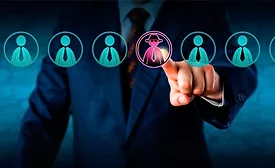Home » insider threats
Articles Tagged with ''insider threats''
Special Report
Walking the line: Navigating the insider threat
Determining the definition of insider risk to your organization is half the battle in mitigating the threat. The other half is more complicated, involving security culture, defined procedures and responses, and a little bit of technology.
June 1, 2021
Enterprise Services
Putting your faith in Enterprise Security Risk Management (ESRM)
With enterprise security risk management, organizations should consider the risks versus potential impact to dictate when and how often they assess risk. What does that mean for your organization?
May 12, 2021
ADM unlocks the power of existing data for COVID-19 response
ADM and its security team tapped into existing data, both inside the company and publicly available, to enable informed decision-making and real-time insight into the company’s pandemic response plan including contact tracing, location insight and information, and facility occupancy.
May 11, 2021
Sign-up to receive top management & result-driven techniques in the industry.
Join over 20,000+ industry leaders who receive our premium content.
SIGN UP TODAY!Copyright ©2026. All Rights Reserved BNP Media.
Design, CMS, Hosting & Web Development :: ePublishing













